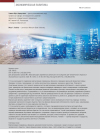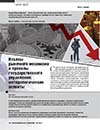Virtualization of Modern Finance and Its Consequences for Human Society
DOI: https://doi.org/10.33917/es-3.183.2022.54-63
The article dwells on the content of the modern finance virtualization, replacement of the real financial sphere with images, titles, simulations with their special space, time, laws and values. Objective reasons for this process are noted: monetary origins of virtualization, equity ownership and issue of securities, derivatives as financial innovations, widespread introduction of modern means of communication and information. Special role of subjective factor in increasing the finance virtualization, when speculation is used to inflate the money supply, is shown. It is emphasized that modern finance has transformed from providing and servicing the economy into dominating the economy. Working primarily for themselves, they operate globally and are constantly in movement.
They are characterized by a permanent change of ownership, blurring, diffusion of property rights, loss of control and exclusion from market self-regulation. Virtual finance is strengthening its dominance, sucking the lifeblood from material wealth, nature, man, appropriating the creative potential of society. At the same time, phenomenon of financial property and power is hidden, veiled, fictitious, dispersed throughout the world space.
The paper concludes that it is necessary to reduce, to put under democratic control the growing volume of modern virtual finance both at the national and international levels, and channel it to address the socio-economic problems of society. But it cannot be limited to this. The threat to existence of the modern world civilization has necessitated preservation and protection of the basic values of human society, the main of which is the person himself with his knowledge, culture, ethics and morality. He must be a healthy, developing personality, provided with all necessary benefits. Man is at the center of society and the state, society and the state should take care of the person.
Источники:
1. Skol’ko vsego v mire deneg? [How Much Money is There in the World?]. Vokrug sveta, 2015, March, 31, available at: http://202020.vokrugsveta.ru/quiz/215270/(31/03/2015).
2. Kak ispol’zovanie proizvodnykh finansovykh instrumentov otrazilos’ na real’nom sektore [How the Use of Derivative Financial Instruments Affected the Real Sector]. Vedomosti, 2015, July, 27, available at: https://www.vedomosti.ru/business/articles/2015/07/27/602226-kak-otrazilis-proizvodnie-finansovie-instrumentina-realnom-sektore.
3. Sazhina M.A. Priroda sovremennykh finansov [Nature of Modern Finance]. Moscow, Forum: Infra-M, 2018.
4. Jamaican currency system and money exchange rates. FreshForex, available at: https://freshforex.com/encyclopedia-forex/jamaican-currency-system/
5. Mezhdunarodnyi valyutnyi fond [International Monetary Fund], available at: https://www.imf.org/ru/home.
6. Nizhegorodtsev R.M., Streletskii A.S. Mirovoi finansovyi krizis. Prichiny, mekhanizmy, posledstviya [World Financial Crisis. Causes, Mechanisms, Consequences]. Moscow, LIBROKOM, 2008.





